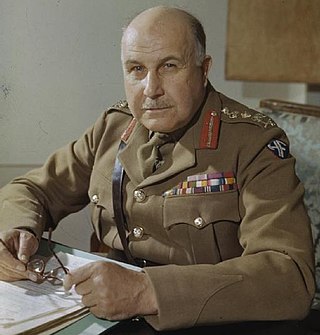
Field Marshal Henry Maitland Wilson, 1st Baron Wilson,, also known as Jumbo Wilson, was a senior British Army officer of the 20th century. He saw active service in the Second Boer War and then during the First World War on the Somme and at Passchendaele. During the Second World War he served as General Officer Commanding-in-Chief (GOC-in-C) British Troops in Egypt, in which role he launched Operation Compass, attacking Italian forces with considerable success, in December 1940. He went on to be Military Governor of Cyrenaica in February 1941, commanding a Commonwealth expeditionary force to Greece in April 1941 and General Officer Commanding (GOC) British Forces in Palestine and Trans-Jordan in May 1941.
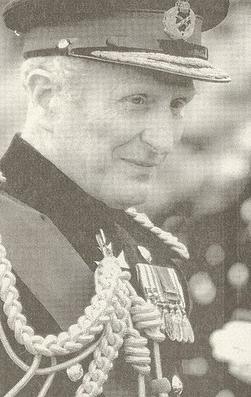
Field Marshal Sir Nigel Thomas Bagnall, was a career British Army officer who served as Commander-in-Chief of the British Army of the Rhine, from 1983 to 1985, and then as Chief of the General Staff (CGS), the professional head of the British Army, from 1985 to 1988. Early in his military career he saw action during the Palestine Emergency, the Malayan Emergency, the Cyprus Emergency and the Indonesia–Malaysia confrontation, and later in his career he provided advice to the British Government on the future role of Britain's nuclear weapons.
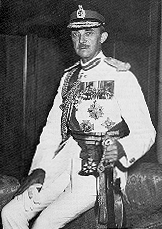
Field Marshal Tun Sir Gerald Walter Robert Templer, SMN, was a senior British Army officer. He fought in both the world wars and took part in the crushing of the Arab Revolt in Palestine. As Chief of the Imperial General Staff, the professional head of the British Army between 1955 and 1958, Templer was Prime Minister Anthony Eden's chief military adviser during the Suez Crisis. He is also credited as a founder of the United Kingdom's National Army Museum.

Lieutenant General Sir Edric Montague Bastyan, was a senior British Army officer, who became Governor of South Australia from 4 April 1961 until 1 June 1968 then Governor of Tasmania from 2 December 1968 until 30 November 1973. He was the last British person to be governor of either state.

Sir John Anthony Holt Saunders, CBE, DSO, MC was chairman of The Hongkong and Shanghai Banking Corporation, at a time of rapid and turbulent development of the Hong Kong economy. In his banking career, as chief manager from 1962, and chairman from 1964 to 1972, Saunders was at the helm of Hong Kong's most important financial institution at a time when the Crown Colony was rapidly changing from a trading post to a regional centre of manufacturing and finance.
Major-General Sir Stuart Greeves and Bar, was a British Indian Army officer. He served in World War I and World War II.

Field Marshal Allan Francis Harding, 1st Baron Harding of Petherton,, known as John Harding, was a senior British Army officer who fought in both the First World War and the Second World War, served in the Malayan Emergency, and later advised the British government on the response to the Mau Mau Uprising. He also served as Chief of the Imperial General Staff (CIGS), the professional head of the British Army, and was Governor of Cyprus from 1955 to 1957 during the Cyprus Emergency. In both Kenya and Cyprus his rule was controversial and authoritarian, based on persecutions and executions.
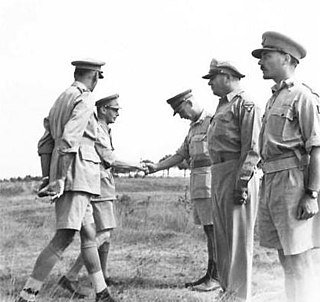
General Sir Charles Falkland Loewen, was a Canadian-born British Army officer who served as Adjutant-General to the Forces from 1956 to 1959.
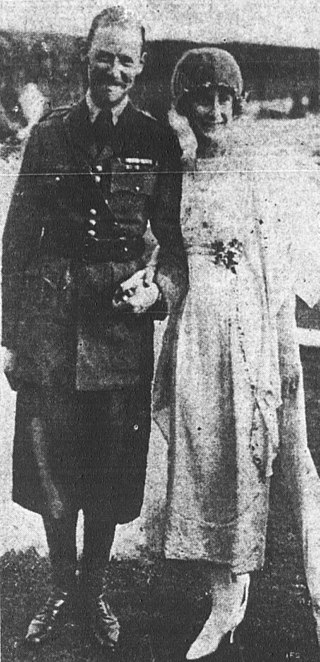
Major-General Sir John Charles Oakes Marriott, was a senior British Army officer who served during the First World War and again in the Second World War.
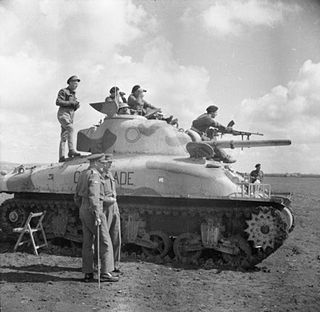
Lieutenant-General Sir William George Holmes was a senior British Army officer who fought with distinction in the First World War. He later served in the Second World War, where he commanded the 42nd Infantry Division during the Battle of France in May/June 1940.
Major-General Thomas Patrick David Scott, was a senior British Army officer.
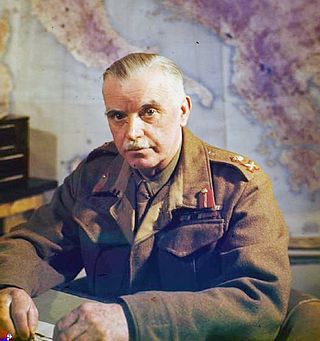
General Sir William Duthie Morgan, was a British Army officer. During the Second World War, he commanded the Mediterranean Theatre of Operations during the late stage of the war.
Sir Gilbert Mackereth was a decorated British Army officer of the First World War who subsequently served as a British diplomat, most notably as Ambassador to Colombia from 1947 to 1953. His is described as 'the real James Bond' in a book about other aspects of his career.

Major General Lewis Owen Lyne, was a British Army officer who served before and during the Second World War. He saw distinguished active service in command of the 169th Brigade in action in North Africa and Italy from 1943 to 1944, followed by the 59th Division during the Battle of Normandy in mid-1944, finally commanding the 7th Armoured Division during the final stages of the Northwestern Europe Campaign until Victory in Europe Day in May 1945.
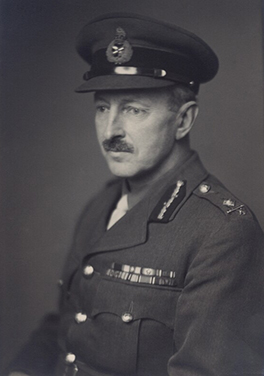
Major-General Walter Edmond Clutterbuck was a British Army officer who fought during both the First and Second World Wars.
Major General Ronald Dare Wilson, was a senior British Army officer, author, and park warden. He was decorated during World War II, commanded 22 Special Air Service Regiment in the early 1960s and ended his military career as Director of Army Aviation. He was instrumental in introducing attack helicopters and high-altitude military parachuting to the British military. In retirement, he served as the National Park Officer of Exmoor National Park.
Leonard Green was an English cricketer active from 1922 to 1935 who played for Lancashire, and a Territorial Army officer who commanded the 125th Brigade from 1934 to 1938. He was born and died in Whalley, Lancashire. Green was born in a house built by his Father, Roger Green, who represented the Whalley Cricket Club at the 1864 meeting which led to the foundation of Lancashire County Cricket Club. At the time of his death, he lived in the Manor House which he shared with his brother James.
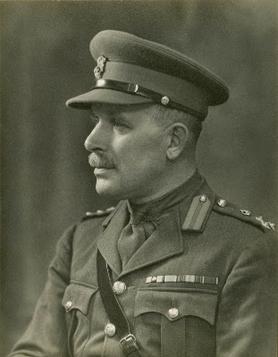
Major General George William Symes, was a senior British Army officer who served in the First World War, in which he was twice awarded the Military Cross. During the Second World War he commanded the 70th Infantry Division in India, and was deputy commander of the Special Force, commonly known as the Chindits, in Burma. He was deputy commander of the lines of communication of the 21st Army Group from May to November 1944, and then commanded the lines of communication in South East Asia Command (SEAC). In June 1945, he became general officer commanding (GOC) in Southern Burma.
Major General Harold Augustus Freeman-Attwood, was a British Army officer who fought in both of the world wars.
Arthur Leslie Walter Newth was a British Army officer. Whilst attending Bristol Grammar School he became a corporal in the school's cadet corps. In 1914 Newth was commissioned into the 4th Battalion of the Gloucestershire Regiment. He served with the battalion on the Western Front and received the Military Cross for gallantry in 1915. Newth was promoted to the acting rank of lieutenant-colonel in 1918 to command the 16th (Service) Battalion of the Cheshire Regiment. He was 21 when he was appointed and was probably the youngest battalion commander of the war.












